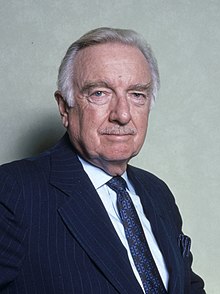 |
| Carlson |
 |
| Cronkite 1983 |
Where have you gone Walter Cronkite? A nation turns its lonely eyes to you. (with apologies to Paul Simon and Art Garfinkel). In this digital age, Americans could sure use a man like Walter Cronkite again. Instead, U.S. politics are defined by false online information and polarizing TV cable networks, Far right Conservatives watch Fox News, which really isn't a news network, although it calls itself one. Meanwhile, those of a more moderate conservative or liberal bent prefer CNN. Progressives, of course choose MSNBC. There was a time when Americans of all political stripes watched Walter Cronkite.
Cronkite anchored the CBS Evening News for 19 years, from 1962 to 1981. He was known as the most trusted man in America, with good reason. Cronkite earned that moniker. He was a true journalist, a man of integrity. He died on July 17, 2009 at the age of 92. Sadly, news reporters such as Cronkite are few and far between. They seem to come from another era, before the advent of Fox News and Tucker Carlson, when the political landscape of America was less polarized. It's sad to think that TV audiences who once listened to broadcasters such as Cronkite are now listening to the propagandists on a far right cable network.
The sudden firing of Tucker Carlson from his popular and highly influential show on Fox has sent shockwaves throughout the media. It's a hot topic, but I'm loathe to place Carlson's name in the same sentence as the legendary Walter Cronkite's. Carlson entertains his TV audience by spewing out racist lies, white supremacist rubbish, anti-immigrant rants and false conspiracy theories. His viewers eagerly lap it up. He tells them what they want to hear and he appeals to their deepest prejudices, their fears and their ignorance. He has also served as a propaganda vehicle for Vladimir Putin's war on Ukraine.
Cronkite was certainly not an entertainer. He was a highly experienced newsman. Unlike Carlson, he delivered the news as honestly and as factually as possible, and he had outstanding journalistic credentials He began his broadcasting career as a radio announcer in Oklahoma City. In 1936, he met his future wife, Betsy Maxwell, while working as a sports announcer for a Kansa City Missouri radio station. In 1937, he became a member of the United Press International in Kansas City.
After receiving a job offer from Edward R. Murrow of CBS News, he joined the Murrow Boys team of war correspondents, becoming head of the Moscow Bureau. When UP offered Cronkite a higher salary, he accepted their offer, driving a wedge between him and Murrow.
During World War II, Walter Cronkite was one of the most prominent American reporters. As a war correspondent, he covered conflicts in Europe and North Africa. After the war, he covered the Nuremberg Trials. From 1946 to 1948, he was the United Press's lead reporter in Moscow.
In 1950, Cronkite joined the expanding television division of CBS News, where he began working at the network's affiliate in Washington, D.C. From 1953 to 1957, he hosted a CBS program called You Are There, which reenacted historical events with modern news reporting.
On April 16, 1962, Walter Cronkite replaced Douglas Edwards as anchor of the CBS nightly news show. He covered the presidencies of John F, Kennedy, Lyndon Johnson, Richard Nixon, Gerald Ford, Jimmy Carter and Ronald Reagan. On November 22, 1963, when Cronkite reported on the assassination of John Kennedy,, he removed his glasses and wiped the teardrops from his eyes. Those were not crocodile tears. The man was sincere. He had empathy for the slain president and he mourned for his nation.
In February of 1968, Cronkite and his executive producer, Ernest Leiser, travelled to Vietnam to cover the aftermath of the Tet Offensive (In January of 1968, during the Lunar New Year (or "Tet" holiday), North Vietnamese and communist Viet Cong forces attacked several targets in South Vietnam. American and South Vietnamese forces suffered heavy losses.
On February 27, 1968, Cronkite closed his broadcast with an editorial report on the situation in Vietnam. He stated the following: "To say that we are mixed in a stalemate, seems the only realistic, yet unsatisfactory conclusion. On the off chance that military and political analysts are right, in the next few months we must test the enemy's intentions, in case this is indeed the last big gasp before negotiations. But it is increasingly clear to this reporter that the only way out then will be to negotiate, not as victors, but as an honourable people who lived up to their pledge to defend democracy, and did the best they could."
Following Cronkite's report on the war in Vietnam, then-President Lyndon B. Johnson is reported by some to have said, "If I've lost Cronkite, I've lost Middle America." Although the journalistic accuracy of that quote has been questioned. there is little doubt that Cronkite's voice resonated with Middle America.
Below is a 1968 photo of Walter Cronkite reporting on location during the Vietnam War.
Walter Cronkite and Tucker Carlson are not only from different eras, but they are cut from different cloths. Cronkite was a true newsman, while Carlson is an entertainer. Cronkite tried his best to tell the truth, while Tucker Carlson misleads for the sake of ratings and money. He praises Donald Trump on air, but writes in an email that he hates Trump passionately. Cronkite was sincere, while Carlson is a fraud. Americans were far better off when they received their news from the reliable Walter Cronkite.
- Joanne

No comments:
Post a Comment